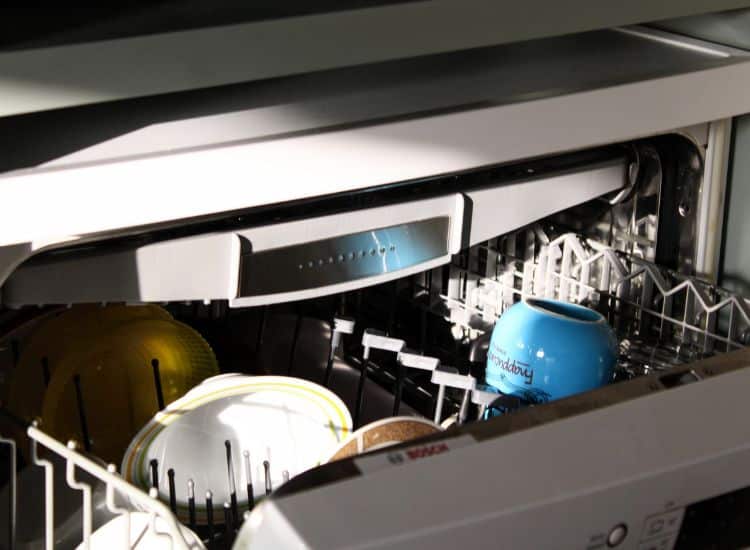
In culinary preservation, Mason jars have become the go-to choice for storing jams, pickles, and other delectable treats. These iconic glass containers have captured the hearts of home cooks and DIY enthusiasts and become a symbol of sustainability and tradition.
Mason jars can be washed in a dishwasher. They are manufactured using strong glass in a dishwasher that can withstand high temperatures. However, it is important to check the manufacturer’s instructions before placing them in the dishwasher.
In this article, we delve into the intricacies of maintaining these timeless vessels, shedding light on the considerations and potential challenges of their cleaning.
The Convenience Quandary: Exploring the Dishwasher Dilemma
In the pursuit of efficiency and convenience, the dishwasher has become an indispensable appliance in many modern kitchens. However, when it comes to preserving jars like Mason jars, the question of whether they can safely be placed in the dishwasher arises. On the one hand, the allure of simply loading the jars into the machine and letting it do the work is undeniable. On the other hand, concerns about potential damage or compromised seal integrity linger, leaving preservation enthusiasts in a quandary.
Mason jars, known for their durable glass construction and airtight seal, have been relied upon for generations to store homemade jams, pickles, and other delectable creations. They are designed to withstand the rigors of preserving, but the dishwasher presents a different challenge. The combination of heat, water pressure, and detergents used in dishwashers can potentially impact the integrity of the jars, leading to issues like cracked glass or weakened seals.
It’s important to consider the potential consequences carefully before putting Mason jars in the dishwasher. While some individuals may have successfully used the dishwasher without experiencing any issues, others have encountered problems. Exploring the various factors, including heat compatibility, construction considerations, and the overall impact on the jars’ longevity, will help shed light on the dishwasher dilemma and empower preservation enthusiasts to make informed decisions about their cleaning methods.
Related posts you may like: Top Load Dishwasher: Is It the Right Choice for Your Kitchen?
The Anatomy of Mason Jars: Understanding Their Construction
To truly grasp the implications of putting Mason jars in the dishwasher, it’s essential to delve into the intricacies of their construction. Mason jars are typically made of sturdy, transparent glass, known for its durability and non-reactive properties. The glass used in these jars is designed to withstand high temperatures and the demands of preserving various foods.
One distinctive feature of Mason jars is their two-part closure system, consisting of a metal band and a flat, reusable lid with a rubber gasket. The metal band secures the lid tightly onto the jar, creating an airtight seal crucial for proper preservation. This sealing mechanism is pivotal in preventing the entry of air and bacteria, keeping the contents fresh.
The glass walls of Mason jars are thick, which contributes to their strength and ability to withstand pressure changes during the preserving process. Additionally, the jars often have embossed markings on the side, indicating measurements for precise recipe preparation and serving.
Understanding the composition and design of Mason jars helps us appreciate their resilience and suitability for preserving purposes. It also sets the stage for a deeper exploration of whether the dishwasher’s environment aligns with the needs of these iconic jars and their delicate components.
Heat and Glass: The Compatibility Question
The compatibility between heat and glass becomes crucial when considering whether to put Mason jars in the dishwasher. Glass, known for its ability to withstand high temperatures, has long been trusted as a reliable food storage and preservation material. However, the dishwasher’s intense heat cycle can pose potential risks to the integrity of the glass and the contents within.
Glass has a thermal expansion coefficient, which expands when exposed to heat and contracts when cooled down. Rapid temperature changes like those experienced in the dishwasher can stress the glass and lead to cracks or breakage. This is particularly true for jars in contact with cold liquids or stored in cool environments before being subjected to the dishwasher’s hot cycle.
Furthermore, glass compatibility with dishwasher detergents is another aspect to consider. Some detergents contain harsh chemicals that may interact with the glass surface and cause cloudiness or etching over time. While the impact may not be immediate, repeated exposure to these detergents could compromise the Mason jars’ clarity and aesthetic appeal.
Understanding the delicate balance between heat and glass is vital when putting Mason jars in the dishwasher. Careful consideration of the temperature differentials, the condition of the jars before cleaning, and the potential long-term effects on both the glass and the contents can help preservation enthusiasts make an informed choice about the most suitable cleaning method for their beloved Mason jars.
Related posts you may like: Is the Dishwasher Connected to the Sink? Understanding Plumbing Connections in the Kitchen
Factors to Consider: Assessing the Dishwasher’s Impact
Before placing Mason jars in the dishwasher, it is crucial to assess the potential impact of the dishwasher’s environment on these beloved preserving containers. Several factors come into play when considering the suitability of the dishwasher for cleaning Mason jars.
First and foremost is the water temperature. Dishwashers typically operate at high temperatures to ensure thorough cleaning. While glass is generally heat-resistant, extreme temperature changes can pose a risk of thermal shock and potential breakage. Care must be taken to avoid exposing Mason jars to sudden temperature differentials, especially when they contain cold liquids or have been stored in cool environments.
Water pressure is another factor to consider. The powerful water jets in dishwashers may exert considerable force on Mason jars, particularly if they are stacked closely or come into contact with other items. The risk of jars rattling against each other or the dishwasher’s interior surfaces can increase the likelihood of breakage.
Detergents used in dishwashers can also impact Mason jars. Harsh detergents may contain chemicals that can interact with the glass or leave residues, compromising the clarity and integrity of the jars over time. Additionally, the metal bands and rubber gaskets on the lids may be susceptible to corrosion or degradation when exposed to certain detergents.
The overall impact on the longevity of Mason jars is an important consideration. While some jars may withstand repeated dishwasher cycles without issues, others may experience gradual wear and tear, compromising their sealing capabilities or overall structural integrity. Preservation enthusiasts must weigh the convenience of the dishwasher against the potential risks to ensure the long-term preservation of their cherished Mason jars.
By carefully assessing these factors, individuals can decide whether to use the dishwasher for cleaning Mason jars or opt for alternative cleaning methods that prioritize the jars’ longevity and preservation capabilities.
The Importance of Proper Care: Maximizing Longevity
Preserving jars like Mason jars hold our favorite recipes and memories of homemade goodness. Proper care is essential to ensure these cherished jars stand the test of time. Maximizing their longevity requires attention to detail and a commitment to preserving their structural integrity and sealing capabilities.
One key aspect of proper care is gentle handling. Avoiding rough handling or dropping the jars helps prevent breakage and maintains structural integrity. It’s important to treat Mason jars carefully, especially when transferring them between different environments, such as from the refrigerator to a dishwasher or vice versa.
Proper cleaning techniques also play a significant role in maintaining the longevity of Mason jars. While some may opt to use the dishwasher, others may prefer handwashing to have more control over the cleaning process. When handwashing, use warm water, mild dish soap, and a non-abrasive sponge to clean the glass jars, metal bands, and rubber gaskets. Pay special attention to removing any food residue or stains to ensure the jars remain pristine.
In addition to cleaning, thoroughly drying Mason jars is crucial. Moisture trapped within the jars or lids can lead to mold growth, rusting of metal components, or a compromised seal. After cleaning, air drying the jars upside down on a clean, absorbent towel or using a dish rack with proper drainage allows for thorough drying and reduces the risk of moisture-related issues.
Proper storage also contributes to the longevity of Mason jars. Store the jars in a cool, dry place away from direct sunlight when not in use. This helps prevent potential damage from temperature fluctuations or prolonged exposure to light.
By prioritizing proper care and adopting appropriate cleaning and storage practices, preservation enthusiasts can maximize the longevity of their beloved Mason jars. With a little extra effort and attention, these iconic preserving containers will continue to serve as reliable companions in pursuing homemade goodness for years.
Related posts you may like: Can You Run the Dishwasher Without Soap? Exploring Alternatives for Clean Dishwashing
Common Mistakes to Avoid: Pitfalls in Dishwashing Mason Jars
While the dishwasher can be a convenient option for cleaning Mason jars, it’s important to be aware of common mistakes that can compromise their integrity and effectiveness. By avoiding these pitfalls, preservation enthusiasts can ensure their Mason jars remain in optimal condition for preserving and storing their favorite foods.
One common mistake is subjecting Mason jars to extreme temperature changes. Placing cold jars directly into a hot dishwasher or vice versa can lead to thermal shock and potential breakage. Bringing the jars to room temperature before placing them in the dishwasher is advisable to minimize the risk of sudden temperature differentials.
Stacking jars too closely or overcrowding the dishwasher is another pitfall to avoid. When jars are tightly packed, there is an increased chance of rattling against each other or the dishwasher’s interior, resulting in cracks or breakage. Give the jars sufficient space to ensure they are not in direct contact with one another during the wash cycle.
Neglecting to inspect the jars before placing them in the dishwasher is a mistake that can lead to unsatisfactory results. Check for any chips, cracks, or weakened seals before cleaning. Damaged jars may not withstand the dishwasher’s environment and can compromise preservation.
Using harsh detergents or abrasive cleaning tools is another pitfall to steer clear of. Harsh detergents can interact with the glass or leave residues, affecting the clarity and integrity of the jars over time. Similarly, abrasive sponges or brushes can scratch the glass, making it more susceptible to damage.
Lastly, neglecting proper drying techniques is a mistake that can lead to moisture-related issues. Failing to thoroughly dry the jars, including their metal bands and rubber gaskets, can result in mold growth, rusting, or a compromised seal. Ensure all components are completely dry before storing or using the jars.
By avoiding these common mistakes, preservation enthusiasts can safeguard their Mason jars from potential damage and preserve their longevity. By prioritizing careful handling, appropriate loading, inspection, using gentle cleaning methods, and thorough drying, the dishwasher can be a reliable ally in maintaining the pristine condition of these beloved preserving containers.
Related posts you may like: Dishwasher Soap Dispenser Opens But Soap Remains Inside It: Here’s How To Fix It
When it comes to cleaning Mason jars in the dishwasher, special attention should be given to the care of their lids and bands. These components play a crucial role in creating a secure seal, ensuring the freshness and longevity of preserved foods. Navigating their care properly is essential to maintain their effectiveness and prolong their lifespan.
First and foremost, it’s important to note that not all Mason jar lids and bands are dishwasher safe. While the glass jars can typically withstand the dishwasher’s environment, the lids and bands may be prone to corrosion or degradation when exposed to dishwasher heat, water, and detergents. It is advisable to consult the manufacturer’s guidelines or labels on the lids and bands to determine their dishwasher compatibility.
Proper cleaning is crucial for lids and bands deemed dishwasher safe. Place them on the top rack of the dishwasher, away from direct exposure to the heating element, to minimize the risk of damage. Ensure they are securely positioned to prevent them from falling into the dishwasher’s bottom or getting caught in the spray arms.
If lids and bands are not dishwasher safe, they should be hand washed separately. Use warm water and mild dish soap to clean them, carefully removing any food residue or stains. Gently scrub them with a non-abrasive sponge or brush, not damaging the rubber gaskets or the metal surfaces.
After cleaning, thoroughly dry the lids and bands. Moisture trapped in the rubber gaskets or metal components can lead to mold growth, rusting, or a compromised seal. Allow them to air dry completely before reassembling or storing them in the jars.
By navigating lid and band care with special considerations, preservation enthusiasts can ensure the longevity and effectiveness of these essential components. Whether cleaning them in the dishwasher or handwashing them separately, proper care will contribute to the continued success of preserving and maintaining the freshness of favorite foods in Mason jars.




